Resistance bands are one of the cheapest and most convenient ways to work out at home (or wherever you want for that matter!). But one can’t help question the durability of what’s essentially a giant elastic band. This post explains if resistance bands can break, how durable they actually are, and how long you can expect them to last.
It is not uncommon for resistance bands to break over prolonged periods of heavy use. The quality of the resistance band will determine its lifespan. Cheap brands will typically last around 6 months before they snap. In comparison, premium brands will usually last for many years before they break.
I’ve gone through several resistance bands (premium and budget) in the past and present.
So I feel qualified enough to share my experience with you.
Below, I’ll also share my top tips on how to prevent your bands from snapping and making them last longer.
I’ll also share a study I conducted to find out how much you can actually stretch a resistance band without breaking it!
Let’s jump straight in.
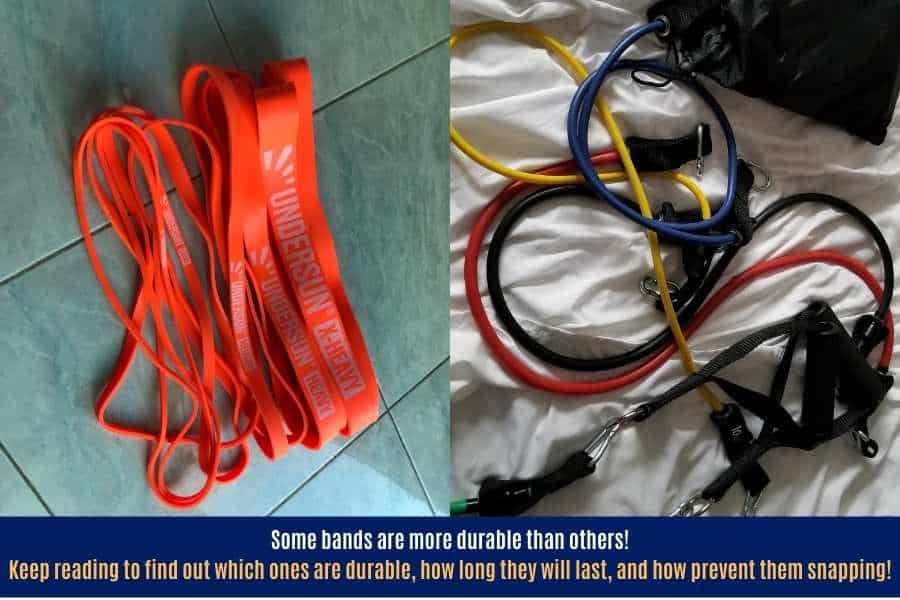
- Resistance Bands Mentioned In This Post
- How Durable Are Resistance Bands?
- How Long To Expect Resistance Bands To Last
- How Long Resistance Bands Last According To Reddit & Amazon
- Ways A Resistance Band Can Wear Out And Break
- Do Resistance Bands Break And Snap Easily?
- How Far Resistance Bands Can Stretch Before Breaking
- Ways To Prevent Resistance Bands From Snapping
- What To Do When A Resistance Band Breaks
- How To Choose A Resistance Band That Will Last Longer
- Best Resistance Bands Recap
- Conclusion
Resistance Bands Mentioned In This Post
| Product | Brand | Description | Prime | Buy |
|---|---|---|---|---|
Top Top
Top
Top
Top
Top
Top | Undersun | BEST OVERALL Circular loop band set with 5x weight increments for beginenrs and advanced lifters to build muscle at home (bundled with door anchor and travel pouch) | PrimeEligible | Check Amazon Price |
 Top
Top
Top
Top
Top
Top Top
Top
Top
Top
Top
Top | Iron Infidel | Circular loop band set with 5x weight increments. No door anchor and less durable than Undersun. But a portion of their profits is donated to the Wounded Warriors Foundation for injured war veterans | PrimeEligible | Check Amazon Price |
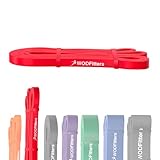 Top
Top
Top
Top
Top
Top Top
Top
Top
Top
Top
Top | WODFitters | Budget circular loop bands that can be purchased as single bands | PrimeEligible | Check Amazon Price |
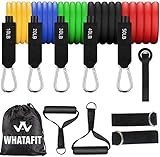 Top
Top
Top
Top
Top
Top Top
Top
Top
Top
Top
Top | Whatafit | BEST BUDGET tube bands with handles. Cheap and affordable for beginenrs but do not provide the same weight or durability as circular loop bands. | PrimeEligible | Check Amazon Price |
 | Theraband | Alternative bands for seniors. Extremely affordable but light resistance bands for general fitness workouts. | PrimeEligible | Check Amazon Price |
 Top
Top
Top
Top
Top
Top Top
Top
Top
Top
Top
Top | Boss Fitness | Door anchor replacement for unlocking exercise angles to isolate different muscle regions like the upper chest | PrimeEligible | Check Amazon Price |
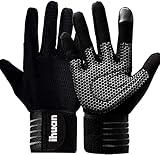 Top
Top
Top
Top
Top
Top Top
Top
Top
Top
Top
Top | Ihuan | Ventilated microfibre-neoprene workout gloves to protect hands from friction burns generated by resistance bands | PrimeEligible | Check Amazon Price |

- Undersun loop bands (link for the cheapest price). A premium resistance band with a lifetime warranty (the manufacturer will replace a broken band). These are the ones I’ve been using for over 3 years now. They’re slightly more expensive than their budget competitors, but they’ll last you a lifetime. These are perfect for bodybuilders, powerlifters, gym junkies, and fitness enthusiasts.
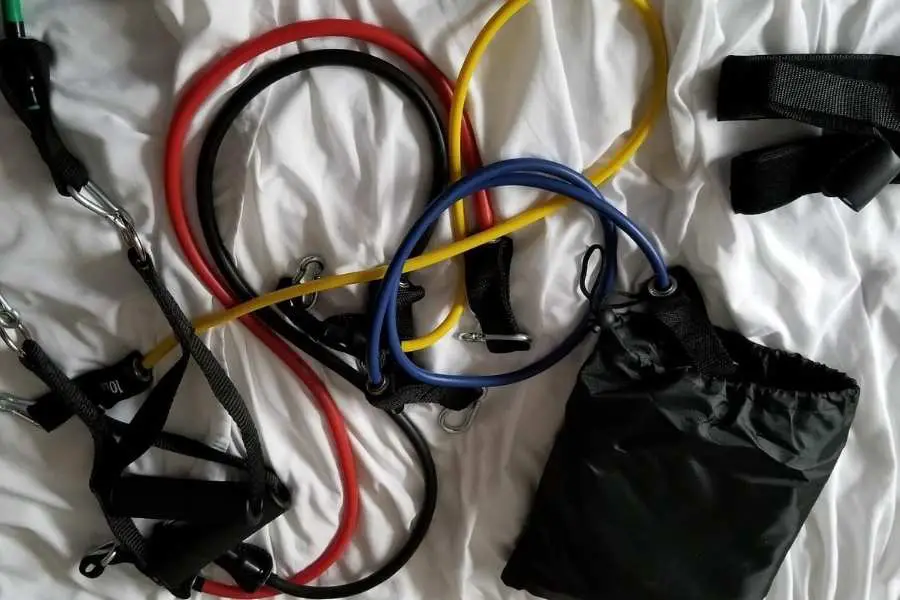
- Whatafit tube bands (link for the cheapest price). A budget resistance band with a 2-year warranty. I’ve gone through multiple sets of similar bands in the past. They’re an excellent way to work out at home on the cheap. But expect them to snap within 1-2 years of heavy use. These are ideal for beginners’ training for casual fitness. I would always recommend spending the extra 20 or so bucks for something that’ll last you a much longer time (hint, the Undersuns!).
How Durable Are Resistance Bands?
Resistance bands are generally a very durable type of training equipment. They are usually made from a combination of natural latex and/or synthetic rubber. These materials have a high degree of flexibility, tensile strength, and can be stretched. Rubber is also water and tear-resistant.
Look.
Rubber is one of the most durable types of material for gym equipment. That’s why you see so much of it, together with iron and steel, in commercial gyms.
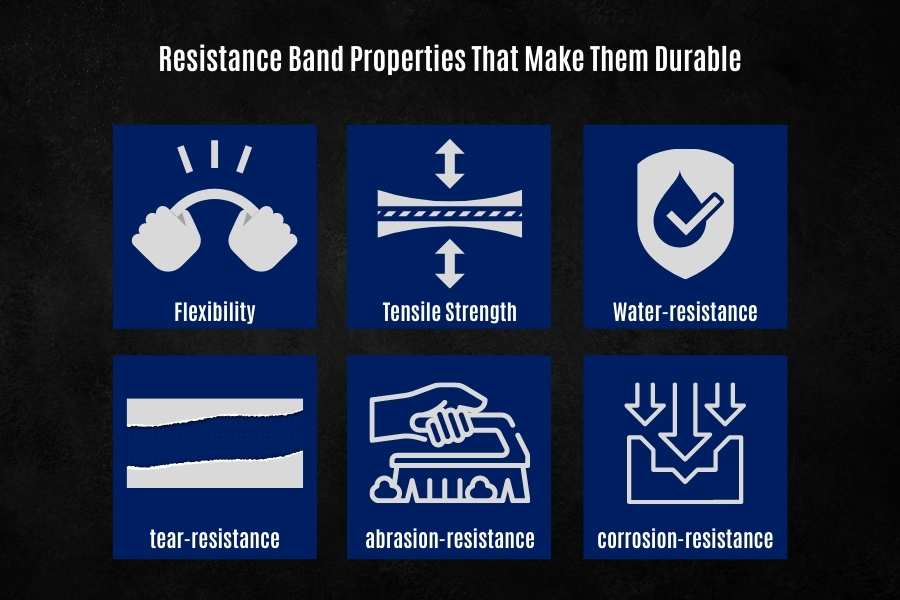
Here are the properties of rubber and latex that make resistance bands so durable:
- High flexibility. Resistance bands are one of few pieces of gym equipment that can bend, twist, and contort without breaking.
- Great tensile strength. Resistance bands can pull, stretch, and generally be put under a great deal of stress and they won’t break.
- High water-resistance. Resistance bands can get wet and they won’t corrode or rust as metal weights can. However, it’s not advised to get them wet too much.
- High tear-resistance. Resistance bands generally have a high tolerance to tearing and kicking damage before they break.
- Good abrasion resistance. Bands also deal well with abrasive damage like friction-generated wear and tear.
- Strong corrosion resistance. Unless they’re subjected to harsh chemicals, resistance bands are unlikely to corrode of their own accord.
How Long To Expect Resistance Bands To Last
Resistance bands will, on average, last between 6 to 24 months. However, the exact lifespan of a resistance band is determined by the quality of the band as well as the frequency and intensity of training. Bands made from high-quality latex and used the least often will last the longest.
As durable as resistance bands are, they (like any other product) will break eventually as a result of normal wear and tear.
Additionally, abusing or misusing your bands will further reduce their lifespan.
The table below gives you a better idea of how long you can expect your resistance bands to last:
| Training Intensity | Estimated Lifespan For Premium Resistance Bands | Estimated Lifespan For Budget Resistance Bands |
|---|---|---|
| High | 2 years or more | 6 months or more |
| Moderate | 3 years or more | 1.5 years or more |
| Low | 6 years or more | 3 years or more |
Training intensity explained:
- High- 5-6 days per week, 60-75 minute workouts, 8-15+ reps per set, heavy resistance.
- Moderate- 3-4 days per week, 45-60 minute workouts, 8-15+ reps per set, heavy resistance.
- Light- 2-3 days per week, 20-45 minute workouts, 5-10 reps per set, moderate resistance.
Resistance band price bracket explained:
- Premium bands- over US$60 for a set.
- Budget bands- under US$50 for a set.
The above estimations are based on my personal 3-year experience owning and using resistance bands from a variety of different brands.
Next, I’ll share my research on how long other people have seen their resistance bands last.
How Long Resistance Bands Last According To Reddit & Amazon
I took to Reddit and Amazon to find out the lifespan of resistance bands owned by other people.
Here’s what I discovered from my research.
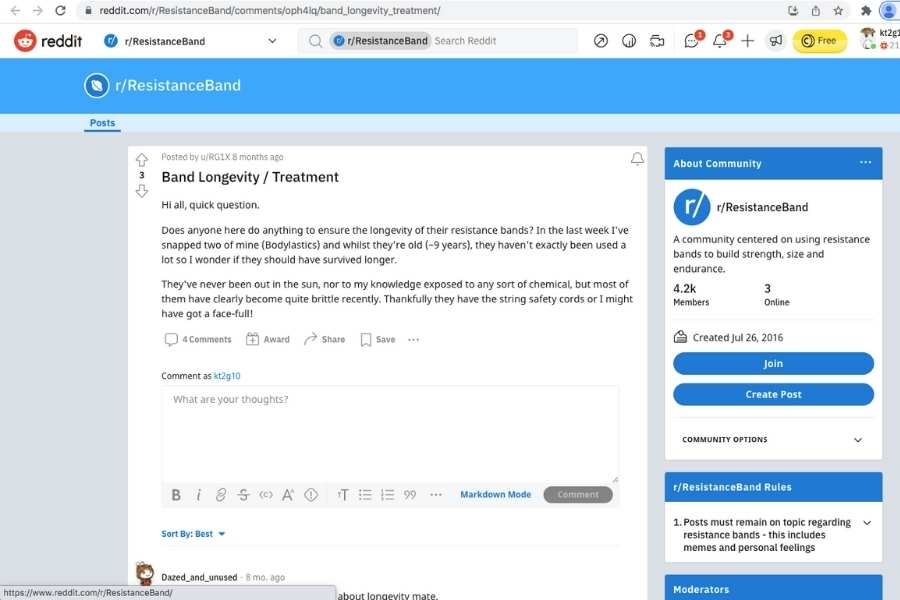
Reddit User-Opinion On Band Durability
There weren’t too many Reddit threads discussing the durability and lifespan of resistance bands.
So I had to come to a conclusion based on compiling the opinions of Redditors on different threads related to resistance band training.
“Five years is the longest for latex [products], and two years is the standard.”
Ch215, Reddit
Generally speaking, most people claimed that their bands lasted around 1-2 years on average, and up to 5 years for the high outliers.
There has even been a report of resistance bands lasting 9 years.
But this is an isolated case and the band had not been used consistently for those 9 years.
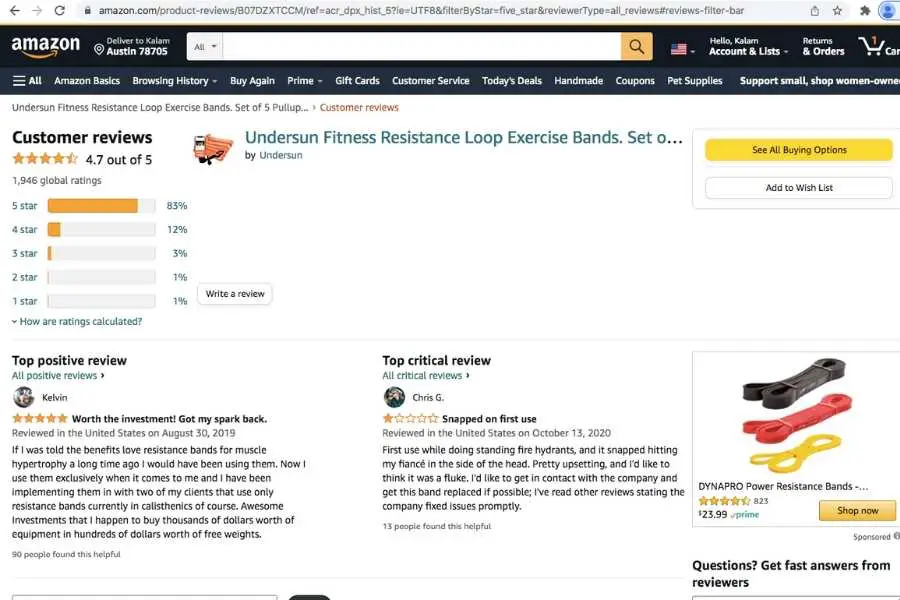
Amazon User-Opinion On Band Durability
The first important detail to point out here is that most resistance bands on Amazon come with a 1-2 year warranty.
In some cases, premium retailers even offer a lifetime warranty.
Taken together, this suggests that most manufacturers expect their bands to last for at least a couple of years before breaking.
Next, I trawled through the customer reviews for two of the most popular premium and budget resistance band brands.
Here’s what I found:
| Lifespan Metric | Understand Premium Resistance Bands. | Whatafit Budget Resistance Bands. |
|---|---|---|
| % Reviews ≤2* | 2% | 3% |
| % Reviews ≥4* | 95% | 92% |
| Number of customers with broken bands | 3 | 112 |
| Average quoted lifespan | Years | Months |
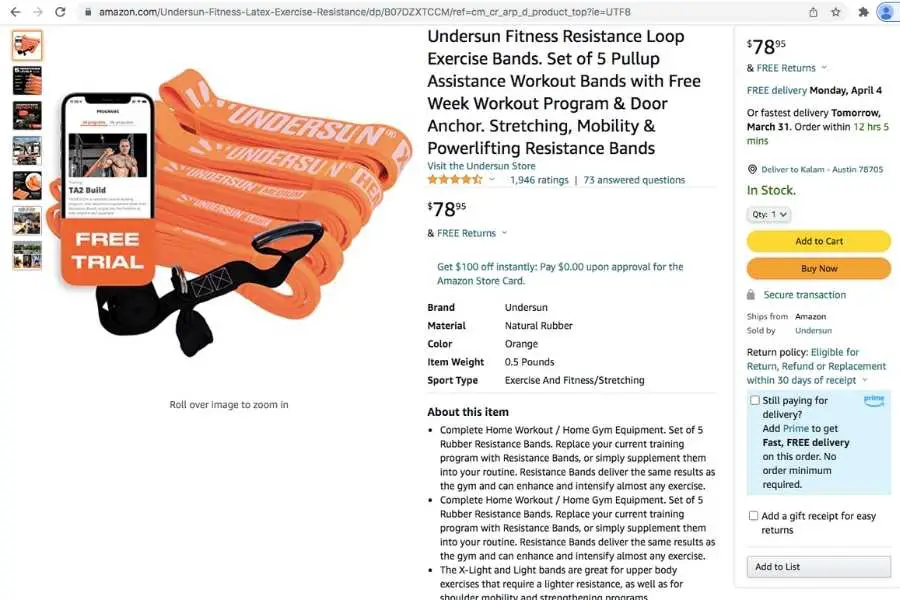
Out of a total of 1,946 reviews for the Undersun resistance bands, only 3 users reported the band snapping.
This usually occurred within a year of purchase.
“Very strong and durable material. [The Undersun bands] will last for years!”
Sal, Amazon
The remaining customers are still currently using their bands after years since the original purchase date, and have seen no major issues.
Some customers also reported the band snapping within a year but also admitted to misuse and abuse.
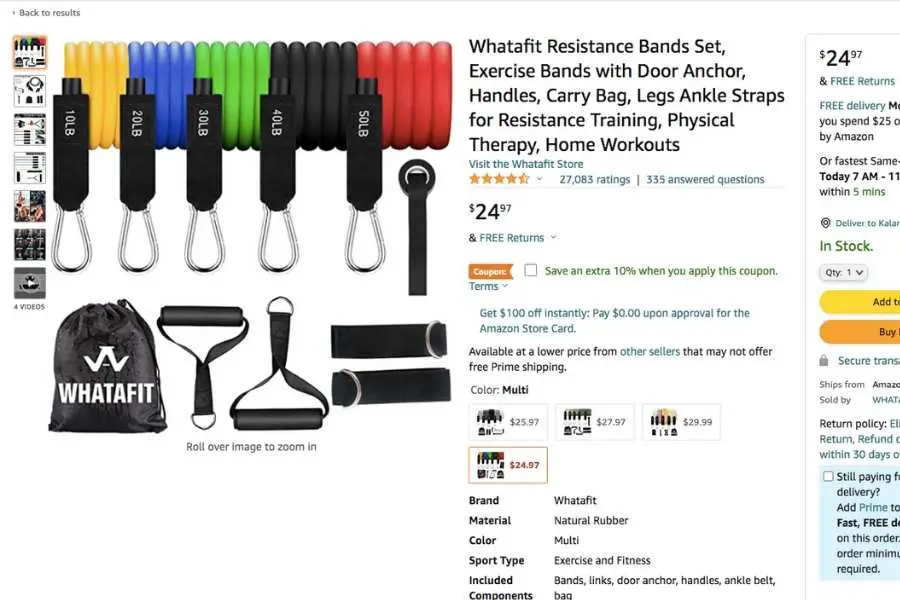
Out of a total of 27,082 reviews for the Whatafit resistance bands, 112 users reported the band snapping.
This usually occurred within 6 months of purchase.
“Two [of my Whatafit] bands are broken after 2 months.”
John, Amazon
The remaining customers are still currently using their bands months and years after they originally purchased them.
So overall, based on Reddit and Amazon, you can expect your resistance bands to last at least a few months to a few years (depending on band quality).
That’s for bands that break by the way…
The majority of people see much longer lifespans!
Ways A Resistance Band Can Wear Out And Break
Even the most durable resistance band will eventually wear out and break. Although latex and rubber are generally very resilient materials, it is common for the molecular components to degrade over time. This usually occurs as a result of normal wear and tear or misuse and abuse.
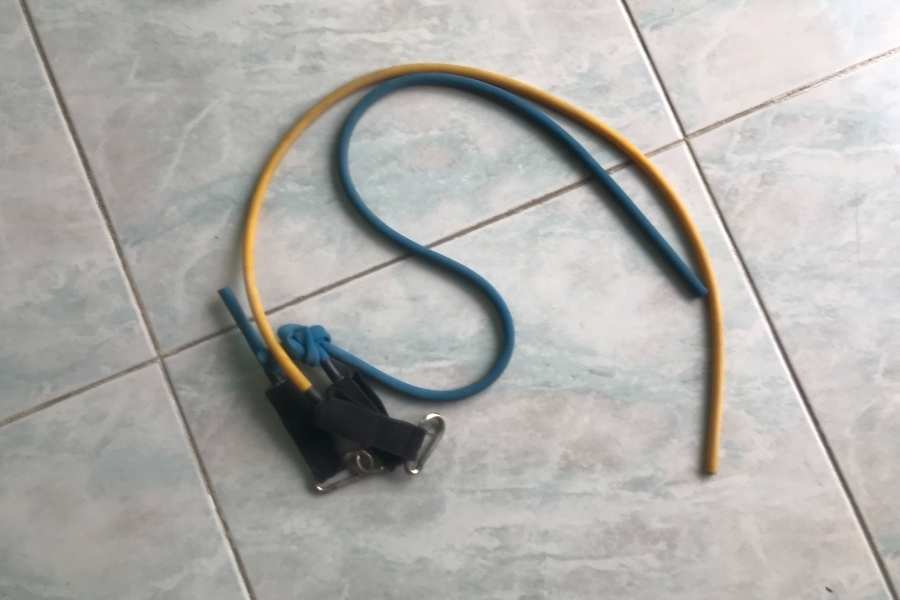
It’s important to regularly check your resistance bands to make sure they are safe to use.
That’s because even the most minor of damages can get worse over time as your brand continues to stretch and retract.
Here are the most common problems with resistance bands, how they wear out, and the signs which indicate that they should be replaced:
| Ways A Resistance Band Can Break | Average Timeframe From Purchase Date | Signs The Band Needs Replacing |
|---|---|---|
| Snapping and popping | 6-24 months | Replace immediately |
| Knicks and tears | 1-12 months | Replace as soon as possible |
| Loose stretch and loss of elasticity | 12 months | Replace when a knick or tear forms |
| Discoloration | 1-3 months | Does not need replacing |
- Snapping and popping. This usually happens after a knick or tear has formed (it’s rare for a band to snap without previous signs of damage). Goes without saying, but a snapped/popped band should be replaced immediately, and preferably before it snaps/pops!
- Knicks and tears. These can form over 1-12 months after unboxing your bands. Knicks will form quicker if you wrap your bands around hard surfaces, pin them to the floor, or step on them during your workouts. Small millimeter-deep knicks won’t cause the resistance band to snap yet. But a larger centimeter-deep tear is a sign that you should replace the resistance band as soon as possible!
- Loose stretch and loss of elasticity. All bands will start losing their natural stretch and elasticity over the first year of purchase, causing them to become loose. This is especially true if they’re frequently pushed to their limits. Loose bands are not a major issue yet. The resistance band can still be used safely. But it should be replaced as soon as a nick emerges.
- Discoloration. Most bands will start discoloring after a few months of heavy use. This usually comes in the form of white marks along regions of the resistance band and results from the natural properties of latex and rubber as it becomes stretched. The resistance band can still be used safely and it does not need to be replaced yet.
Do Resistance Bands Break And Snap Easily?
Resistance bands are generally durable but they can easily break or snap if they are misused or abused. The other way they can break is through general wear and tear over years of heavy use. This makes it important to inspect a band regularly to check for signs of damage.
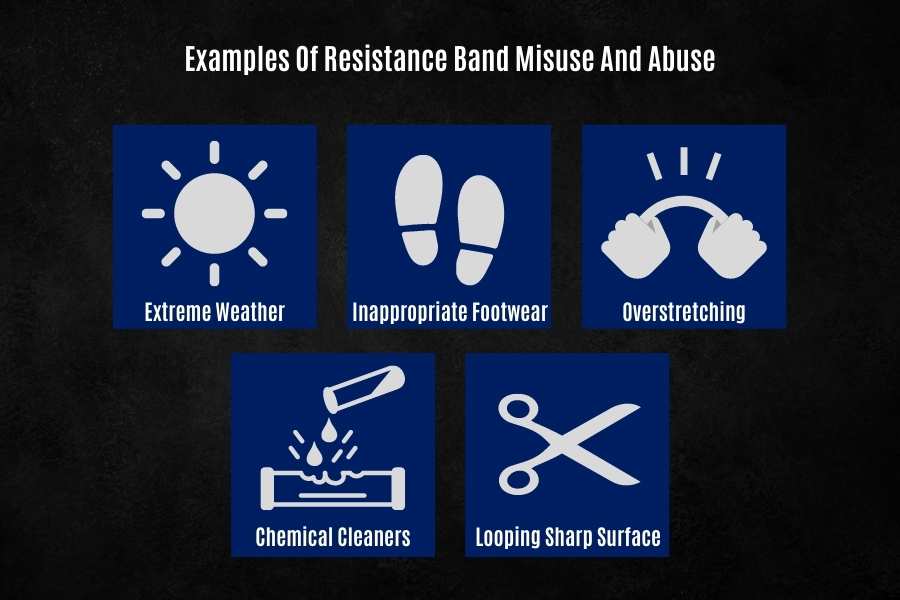
Here are some of the most common ways resistance bands are misused and abused (avoid doing these!):
- Do not store bands in extreme weather conditions. High levels of heat, cold, humidity, or sunshine will damage the molecular integrity of rubber and latex. This can cause your resistance bands to deteriorate rapidly and eventually break.
- Avoid stepping on bands with inappropriate footwear. A lot of exercises require you to step on one end of the band to keep it planted on the ground. If the soles of the shoe are hard or have ingrained stones, this can knick and tear your resistance band.
- Avoid overstretching and double-looping. This goes without saying, but you shouldn’t over-stretch your bands. Neither should you double-loop too often. This is when you loop a band on itself to make it shorter and effectively double the resistance.
- Do not subject the band to harsh chemical cleaners. Bleach, detergents, ammonia, alcohol, phenols, acids, and alkalis are all chemical cleaners that break down the rubber in your resistance bands.
- Do not loop the bands around sharp or hard surfaces. Lamp posts, rails, fences, weight benches, and door handles may all seem like a convenient way to anchor your resistance band, but they can easily damage the band and cause it to break or snap.
How Far Resistance Bands Can Stretch Before Breaking
Resistance bands can, on average, stretch up to 3 times their resting length and remain safe from breaking. Stretching a resistance band any more than this will significantly increase the risk that it overstretches, develops a tear or a knick, and eventually snap on the user.
I determined this by conducting a simple experiment using my Undersun resistance bands (I used the “medium band” out of 5 possible band strengths).
First, I looped one end of the band around my front gate as shown below. This is the “resting length”.

Then I stretched it to 2 times its resting length. At this point, I could feel the tension, but the band felt more than capable of stretching more.
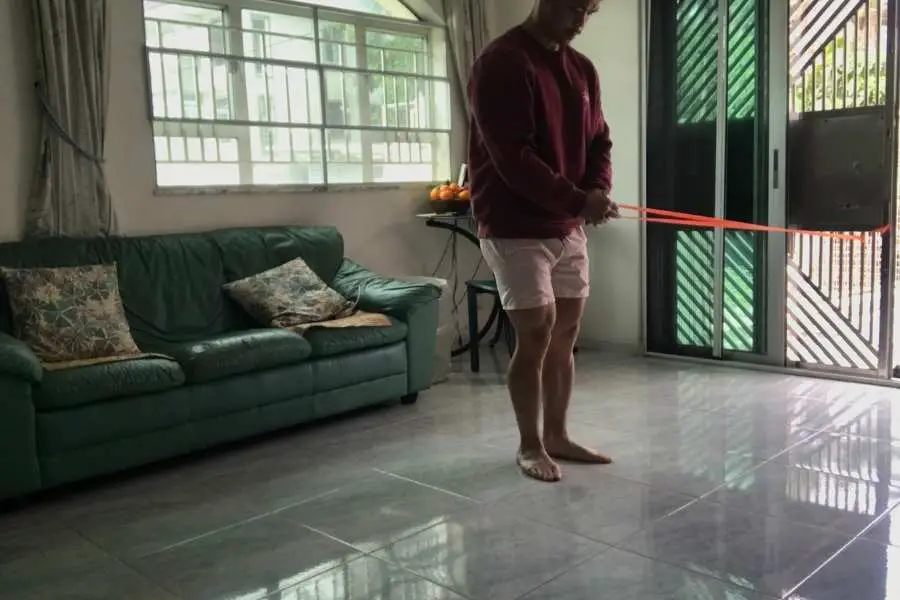
Next, I stretched it to 3 times its resting length. At this point, the tension was extremely prominent and it felt dangerous to stretch it even further (I was paranoid about the band snapping into me!). I deemed this to be the maximum length the Undersun band could stretch.
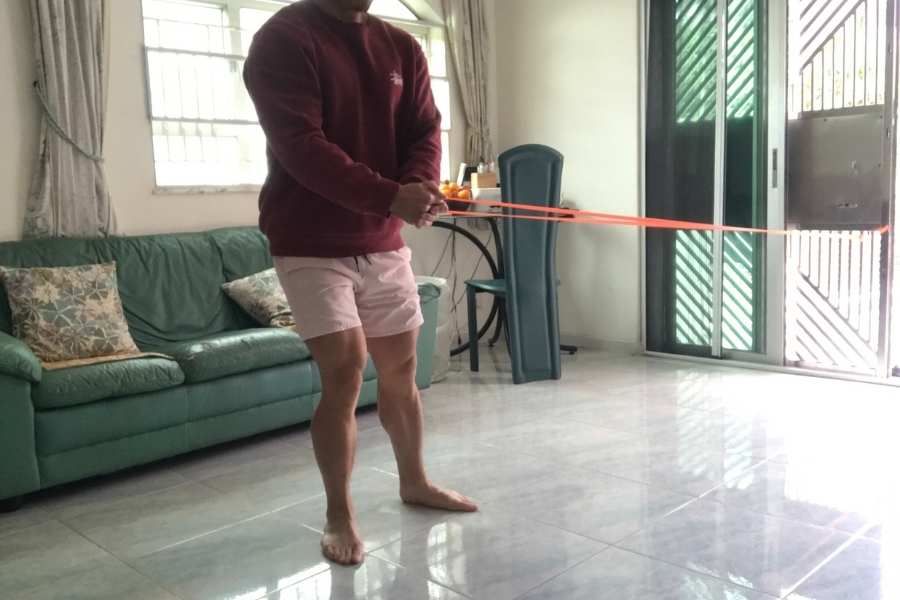
It should be noted, however, that this experiment was conducted on the Undersun bands (you can find the cheapest price here), which are a premium brand.
Cheaper competitors will unlikely be able to safely stretch as far!
Ways To Prevent Resistance Bands From Snapping
Now, here are 13 ways to prevent your resistance bands from snapping and make them last longer than average:
- Never go past the maximum tension. This is around 3 times their resting length as concluded by my above study (less for cheaper bands). Avoid double-looping to increase resistance.
- Don’t go past maximum tension. Never stretch a resistance band over 2.5 times its length. Avoid double looping to increase resistance. A good pair of bands like the Undersuns will come in a set that has a variety of resistance levels for you to choose from.
- Ease into new bands. Just like any product with moving parts, it’s important to ease your bands into use. Don’t jump straight into a 60-minute body-blitzing workout straight after opening your bands. Stretch them out a few times a day for a week first.
- Avoid jerking movements. Performing movements erratically and suddenly are not only ineffective training-wise, but they will also increase the risk of a tear forming in your bands. It’s much better to lift in a slow and controlled manner.
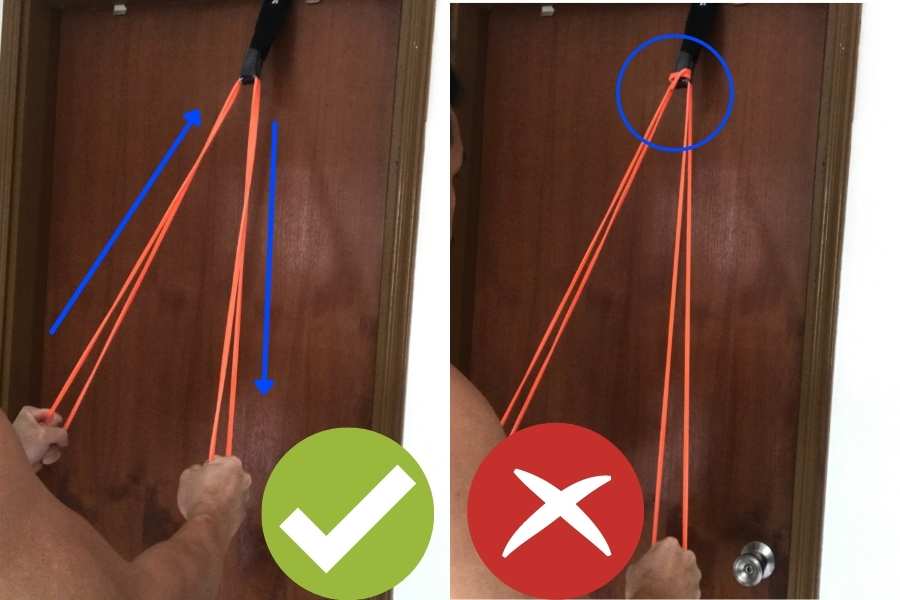
- Avoid sawing. This is when you thread your band through a door anchor and start pulling it from side to side. Friction builds up heat and mechanical stress. This can damage your bands over time. You can tie a loop between the band and the anchor to prevent sawing during exercises that require you to pull the bands side-to-side.
- Inspect before and during use. This is the best way to prevent a resistance band from unexpectedly snapping on you. Speaking from experience (!), bands mostly snap only when there has been a previous tear or knick. So each time you use a band, make a visual inspection to make sure there aren’t any weakened areas. These usually occur in the region that’s closest to the handle (where the most tension is generated). If there is damage, it may be time to ditch the band!
- Be careful about looping bands over feet. You’re going to have to loop the band over your feet if you want to do exercises like the resistance band row. Just sure the shoe soles are rubber. Make sure there aren’t stones stuck in the sole. Maybe consider working out in socks rather than sneakers if possible.

- Use a yoga mat when stepping on bands. Exercises like resistance band deadlifts require you to step on your bands. Use a cheap foam yoga mat like this one from Amazon to provide a layer of protection for your bands.
- Clean resistance bands using water-only. A simple cloth and warm water are all that’s needed to clean your bands. Never use harsh chemical cleaners because this breaks down the molecular integrity of rubber.
- Avoid storing in extreme weather and temperature. Outside storage, sunlight, heat, cold, and humidity are a surefire way to reduce the lifespan of your resistance bands and cause them to break earlier!
- Do not use bands with oily hands. Hand creams and oils can damage the integrity of latex and rubber, causing them to break sooner rather than later!
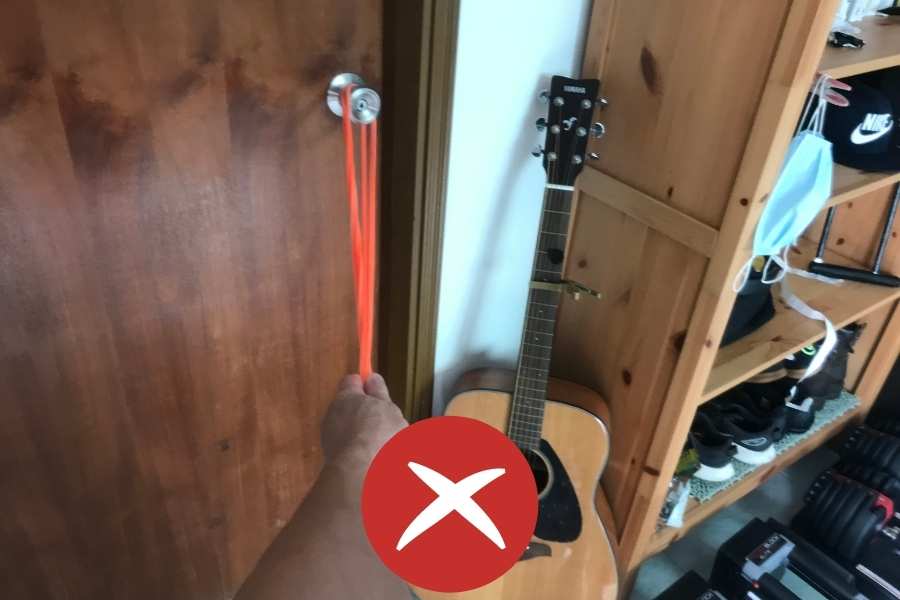
- Use a proper anchor when tethering. Try to avoid wrapping the bands on hard/sharp surfaces like a door handle or weight bench. Use a proper door anchor instead. Most resistance band brands come with a bundled door anchor. If not, then you can get a cheap (but good) one like this Boss on Amazon.
- Do not loop bands through rings and hard anchor points. These have a low surface area that digs into your bands like a knife-edge. The issue is further compounded by the tension generated when pulling on the band. Additionally, hard surfaces are also likely to damage your resistance bands.
What To Do When A Resistance Band Breaks
People with broken resistance bands have multiple options. If the band is under warranty, then the seller can be contacted and a replacement can be arranged. Alternatively, a new pair of bands can be purchased. Finally, a DIY home fix can also be attempted.
I would always recommend the first option.
Budget bands may sound cheap at first, but you shouldn’t forget that they usually only come with a 1-2 year warranty (if that).
Additionally, you know by now that budget bands usually don’t make it past the 1 to 2-year mark.
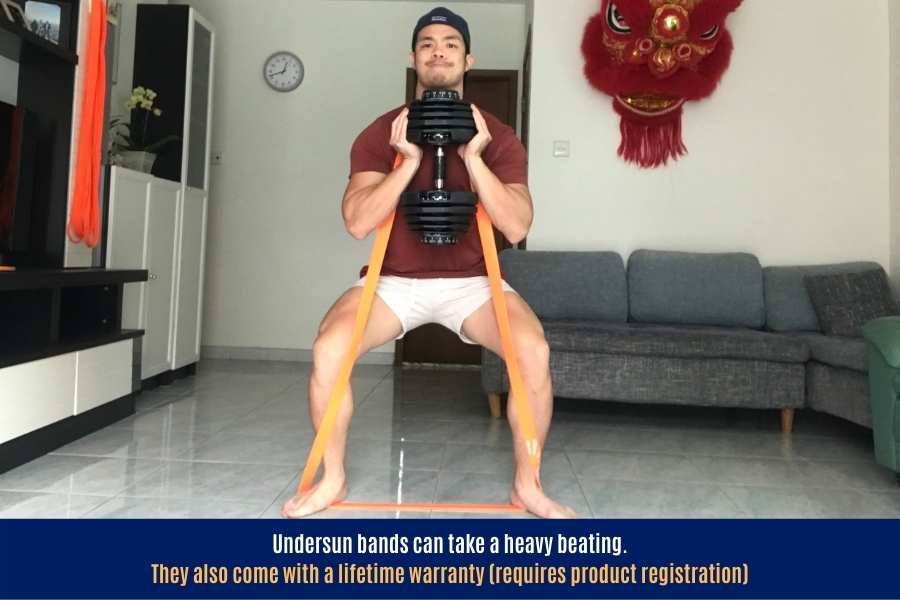
That’s why I always recommend spending that tiny bit extra for premium bands like the Undersuns (you can get them delivered quickly here) which give you a lifetime warranty if you register the purchase.
If the band breaks, simply contact support@UndersunFitness.com and they’ll send you a replacement!
But what if you already own a pair of bands that have snapped?
You can try repairing them using this tutorial!
Just be cautious.
I have never tried this method before and it comes with a great deal of risk (a high tension band snapping back on you is no fun trust me!).
But it’s something you can try should you wish.
How To Choose A Resistance Band That Will Last Longer
Here are the qualities of a good resistance band:
A good thickness. I prefer traditional resistance bands over tube bands which have a hollow core and are thinner overall. Traditional bands are both wide and thick. And this reduces the likelihood they will snap.
A good deal of length. The band should be around 1m in length (minimum). This allows them to give you more resistance and reduces the likelihood the band will roll up on your thighs during exercises like the banded squat where the band wraps around your legs (this happens when the band is too small).
Good quality rubber. Natural latex is usually much stronger than synthetic rubber compounds.
Comes as a set. This means you don’t have to double-loop your bands to get extra resistance. Simply combine multiple bands instead. This spreads tension amongst the “bundle of bands” and reduces the likelihood they will break.
Has a lifetime guarantee. Not all brands have this. Only the best brands will offer you a lifetime warranty. These brands really do stand by their product!.

Looking for a new set of bands?
I’ve been using these Undersuns for over 3 years now and can’t fault them one bit.
I mean, if I had to choose a negative, it would be that they cost a tiny bit more than their budget competitors (and I’m not personally a fan of orange).
But other than that, these are affordable and excellent resistance bands (the best in my opinion!).
You can get the Undersun bands delivered quickly here.
Alternatively, if you’re looking for something cheap and cheerful, then the Whatafit bands (link for the cheapest price) will do the job.
Best Resistance Bands Recap
| Product | Brand | Description | Prime | Buy |
|---|---|---|---|---|
Top Top
Top
Top
Top
Top
Top | Undersun | BEST OVERALL Circular loop band set with 5x weight increments for beginenrs and advanced lifters to build muscle at home (bundled with door anchor and travel pouch) | PrimeEligible | Check Amazon Price |
 Top
Top
Top
Top
Top
Top Top
Top
Top
Top
Top
Top | Iron Infidel | Circular loop band set with 5x weight increments. No door anchor and less durable than Undersun. But a portion of their profits is donated to the Wounded Warriors Foundation for injured war veterans | PrimeEligible | Check Amazon Price |
 Top
Top
Top
Top
Top
Top Top
Top
Top
Top
Top
Top | WODFitters | Budget circular loop bands that can be purchased as single bands | PrimeEligible | Check Amazon Price |
 Top
Top
Top
Top
Top
Top Top
Top
Top
Top
Top
Top | Whatafit | BEST BUDGET tube bands with handles. Cheap and affordable for beginenrs but do not provide the same weight or durability as circular loop bands. | PrimeEligible | Check Amazon Price |
 | Theraband | Alternative bands for seniors. Extremely affordable but light resistance bands for general fitness workouts. | PrimeEligible | Check Amazon Price |
 Top
Top
Top
Top
Top
Top Top
Top
Top
Top
Top
Top | Boss Fitness | Door anchor replacement for unlocking exercise angles to isolate different muscle regions like the upper chest | PrimeEligible | Check Amazon Price |
 Top
Top
Top
Top
Top
Top Top
Top
Top
Top
Top
Top | Ihuan | Ventilated microfibre-neoprene workout gloves to protect hands from friction burns generated by resistance bands | PrimeEligible | Check Amazon Price |
Conclusion
I’ve explained how and why resistance bands can break, how durable they are, and how long you can expect your bands to last.
Generally speaking, resistance bands can last you anywhere between 6 to 24 months or more.
But the exact lifespan will also depend on the quality of the band, frequency and intensity of training, and how well you look after them.
I’ve also shared tips on how you can prevent your resistance bands from snapping and make them last longer.
Apply these tips and you can expect your bands to last on the longer end of the spectrum!
Are you concerned about your resistance bands breaking?
Feel free to send me a message if you have any questions! You can find my details on the “contact us” page.
You may also be interested in the downloadable Kalibre Blueprint PDF which details exactly how I gained 40lbs of lean muscle (it’s 100% free!). It details the exact exercises and nutrition (with printable worksheets) I used to go from skinny to ripped!
Thanks for reading guys!
Peace Out,
Kal
(Biochemistry BSc, Biomedical Sciences MSc, Ex-Skinny Guy)


